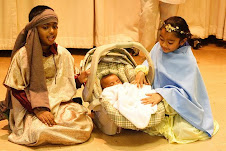Man:
The very first
book of the Bible in its very first chapter declares that ‘…God created man in
his own image, in the image of God he created him…’ 27. In Hamlet, Shakespeare
wonders, ‘What a piece of work is a man! how noble in reason! how infinite in
faculty! in form, in moving, how express and
admirable! in action how like an angel! in apprehension how like a god!
the beauty of the world! the paragon of animals!’
It is this man
who is hungry, has no roof over his head, let alone anything else. This man was
represented by the very Son of man, Jesus when he was hungry (Mk 11:12) and had
nowhere to lay his head (Mt 8:20). Consolingly he identified himself with the
hungry, the naked, the stranger, the sick, the prisoner etc in Mt 25:34ff.
The toll of
starvation today is equivalent to a Hiroshima every three days! V. R. (Krishna
Iyer) ‘…twenty eight people, most of them young children, are dying this very
minute – twenty eight people no different from you or me or our children,
except that we had food and they do not.’ (Morilyn Ferguson: The Aquarian
Conspiracy, pp 455-56) Let us listen to Gandhi wailing of his own countrymen:
‘The poor sisters of Orissa have no saris; they are in rags yet they have not
lost all sense of decency; but I assure you, we have lost. We are naked in
spite of our clothing and they are clothed in spite of their nakedness.’ (M. K.
Gandhi: Socialism of My Conception, pp 108-9) In basic human capabilities,
India ranks 134; in adult literacy almost half the population remain
unlettered; the percentage of underweight children are 63 and pregnant women
with anaemia aged 15-49 are at 88%. How will one justify this deprivation
against the dignity of man which is akin to that of God himself?
In this background
let us listen to Vivekananda: ‘We talk foolishly against material civilization…
Bread! Bread! I do not believe in a God who cannot give me bread here, giving
me eternal bliss in heaven. Pooh! ...more bread, more opportunity for
everybody…’ Now listen to Gandhi again: ‘…the
economic constitution of India, and for the matter of that of the world, should
be such that no one under it should suffer from want of food and clothing. In
other words, everybody should be able to get sufficient work to enable him to
make the two ends meet…’ (Young India, 15th November 1928)
How this
situation of want/deprivation compromises with the picture of man drawn in the
Bible and in other literatures? On the contrary it challenges it which is an
affront to human dignity and worth.
‘…Before they
would work for change they have to believe that change is possible, that a
culture fixated on individual profit-seeking alone is not ‘natural’. The
tragedy is that we have had to reach the point where so many people are hungry
and malnourished… before we could begin to see that our system- a system built
on the vulnerabilities of the human personality instead of its strengths- can
never create a human society.
…we must not
allow our appropriate sense of urgency to lead to frustration and despair. It
took centuries to create the structures that cause the worldwide deprivation we
now witness. It will take time to construct a human world. That does not
belittle our task; that makes it all the more important. Our personal time frames
have changed. We must come to understand today’s struggle in light of the
entire scope of human history. We must not limit our vision by what we see
around us today. What we see today may tell us little about what our children
and their children are capable of creating.’ (Food First, p. 503)
Let us conclude this reflection by quoting
Gandhi again: ‘There is enough for everyone’s needs, but not to anyone’s
greed.’
[Indebted to
Justice V. R. Krishna Iyer, “…..’


No comments:
Post a Comment